Eagle's Claw
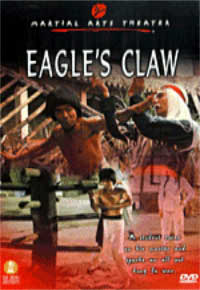
Reviewed by Yves Gendron
Dating back from 1977, EAGLE’S CLAW is a kung-fu
potboiler with a twist starring minor martial stars Chi Kuan-chun and Don
Wong. Chen Tien-chun (Chi Kwan Chun) and Li Chi (Don Wong) are the top students
in an Eagle Claws martial art style school. One day an old enemy of their
master, the long white-haired Chow Ma-wu (Chang Yi), comes back with his
own disciples to settle some old scores. He has now become an exponent of
the lethal Mantis Fist and he and the Eagle’s master grievously hurt each
other in the ensuing duel. Knowing he is dying and his school still endangered
by Chow, the Master appoints Li Chi as his successor much to the dismay of
Chen the expected heir. In fact he grows so bitterly despondent over this
that he accidentally kills the ailing master in a drunken rage. Now a pariah
hunted down by his own former Eagle fellow disciples, Chen is invited to
join the enemy camp. Having to choose between a life on the run or becoming
a complete betrayer, Chen’s decision will determine the very survival of
the Eagle Clan. But everything may not be actually what it seems.
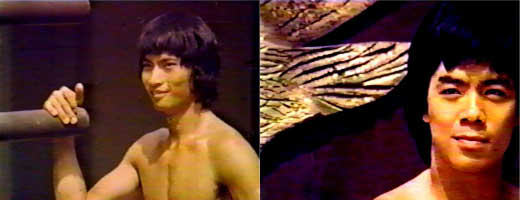
While EAGLE'S CLAW uses the familiar element of the vengeance driven plot,
the white haired villain and the rival animal styles, the tale is given a
whole now twist by having the usually heroic Chi Kuan-chun apparently heading
towards the dark side. It’s a neat trick leading to quite griping suspense,
drama and plot twists that is head and shoulders above those usually found
in k-f films. There is much fighting throughout the film but they usually
don’t last very long and end before any real excitement can be built-up.
Thankfully, the last twenty minutes contains two sustained bouts, involving
blade-wielding henchmen. The movie’s most quirky element also develops
in the last third of the film. Chi Kuan-chun’s character begins to flirt
with the cute female henchman, who as she keeps exchanging barbs and slaps
(“you’re the most cunning and odious man I ever got to know”) with Chen is
slowly falling for him, a very neat plot development.
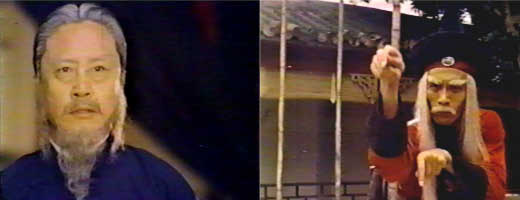
Shortly after having seen EAGLE'S CLAW's English sub version, this reviewer
saw a French-dub one. Besides sparing me the arduous task of having to decipher
hard to read sub-titles, this version actually sports dubbing voices of astonishing
warmth and eloquence. English dubbing jobs are notoriously bad and have massively
contributed to k-f cinema’s repute of cheesy mediocrity, while the French
ones on the other hand sound very classy with voices done by seasoned actors
(which may explain why the French have generally a somewhat greater respect
for martial art cinema than Anglo-Saxons do). Unfortunately at least some
French distributors took the sorry habit of drastically cutting their k-f
exports. Not for any censorship reason (as in England) but to shorten
the running time and to allow for more daily screenings, a despicable practice
that is especially disheartening considering the usual great quality of the
dub.
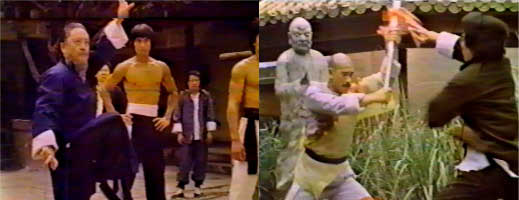
EAGLE'S CLAW was directed by Lee Tso Nam deemed by many as one of the best
Taiwanese-based independent k-f directors whose HOT COOL AND VICIOUS (76),
THE WOMAN AVENGER (78) and LEGS FIGHTERS (80) are also reviewed on this web
site. His movies often featured an unusual take on a convention of the genre,
sounder dramatic plotting as well as memorable characters. EAGLE'S CLAW is
well in line with his other films and might be one of his very best works.

Both Eagle Claws and Mantis fist are actual martial art styles of northern
origin. Eagle (or Ying Jao in Chinese) is said to date back to the Yuen Dynasty
(1271-1366). It is therefore a much more ancient art than the southern Shaolin
derived styles usually seen in k-f movies such as Hung Gar or Wing-Chun which
were primarily developed in the course of the last three centuries.
A joint-hook, throw down, pressure point attacks centred brand of fighting,
Eagle Claw is said to actually look like Japanese Jujitsu to some degree.
Its main recognisable features are it’s claw like handgrip and it’s characteristic
stance mimicking a bird of prey. Like Eagle, Mantis (or Tong Lun) is a pressure-point
attack centred, a merciless brand of fighting. Typically the mantis stylist
would grasp an opponent’s arm with it’s hook-like hand, throw him off-balance,
leaving him open to a devastating darting attack on some of the body’s most
vulnerable areas, such as the throat, the temple, or the armpits. Both Eagle
and Mantis are favourites among k-f movie choreographers because of their
flashy, exotic moves, although whether these arts are accurately being shown
in this particular film might be another matter entirely. Indeed the two
EAGLE CLAWS stars are actually southern animal stylists while the main villain
Chang Yi and the fight choreographer – Tommy Lee - are Peking Opera trained
performers. Except for the opening credits sequence, the film does not really
offer any real insight into how Eagle Claws truly works and the film contains
some typical Peking Opera acrobatics as well as a couple of wire enhanced
jumps, which thankfully do not really detract from the fight scenes.
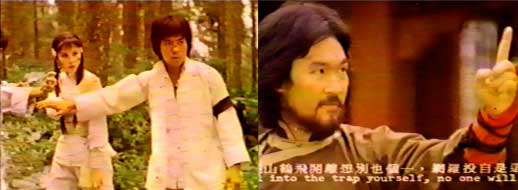
EAGLE'S CLAW's lead star Chi Kuan-chun was a discovery of the great martial
art filmmaker Chang Cheh who showcased him during his Taiwanese autonomous
period between 1974 and 1977. Towering and stoically intense, Chi was the
perfect foil for the smaller and impish Fu Sheng and they were often paired
together as in SHAOLIN MARTIAL ART (74), FIVE SHAOLIN MASTERS (75) and DISCIPLES
OF SHAOLIN (same). But while both Chang Cheh and Fu Sheng eventually rejoined
the Shaw Brothers studio in H-K, Chen continued his career on his own. Up
through the early Eighties he made another twenty movies (he made 32 in total)
and but since then he appears to have transitioned to television. As a real
live Hung-gar exponent, Chen is a splendid screen-fighter with great presence
but rather a one-note actor. The film’s villain is being played by Chang
Yi who actually started out in the late sixties as a Shaw Brothers heroic
lead player before switching to bad guys towards the mid-seventies. One of
his henchmen appearing towards the end is a shaved Phillip Ko wielding a
steal retractable spear. Another one is Leung Kar Yan who had his screen-debut
with SHAOLIN MARTIAL ART, one of Chen Kwan Tai’s very first movies. Ironically
a couple of years later in the Sammo directed THE VICTIM (80) both Leung
and Chang would work again although this time, it was Leung as the hero to
Chang Yi’s usual ruthless bad-guy. One of Chen and Don Wong’s fellow Eagle
Claw disciples is being played by Lung Fung (a.k.a. Jimmy Lee) who would
become quite notorious later on in playing villains in gambling movies such
as GOD OF GAMBLERS (89). EAGLE was also the film debut of cute Hwa Ling who
did a handful of k-f movies in the late seventies. She’s involved in some
fights which she performs all by herself, but neither her role as the Eagle’s
master daughter or her fighting make any real great impression. The lovelorn
henchwoman played by an actress named Wang Kuai-sheng on the other hand is
a bit more memorable.
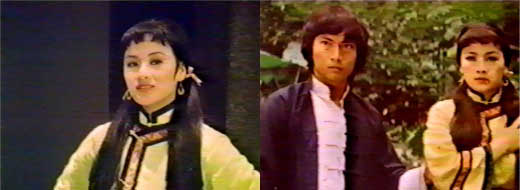
In the end some viewers might find EAGLE'S CLAW just too tame in terms of
fighting to fully satisfy. On the other hand, in a genre where formulaic
and sloppy plotting is the rule, the intriguing take offered by EAGLE'S CLAW
isn’t something to overlook thus making the movie into a very recommended
find for those who would have something more than mere exotic fist fights
on their k-f menu.
My rating for this film: 7.5







